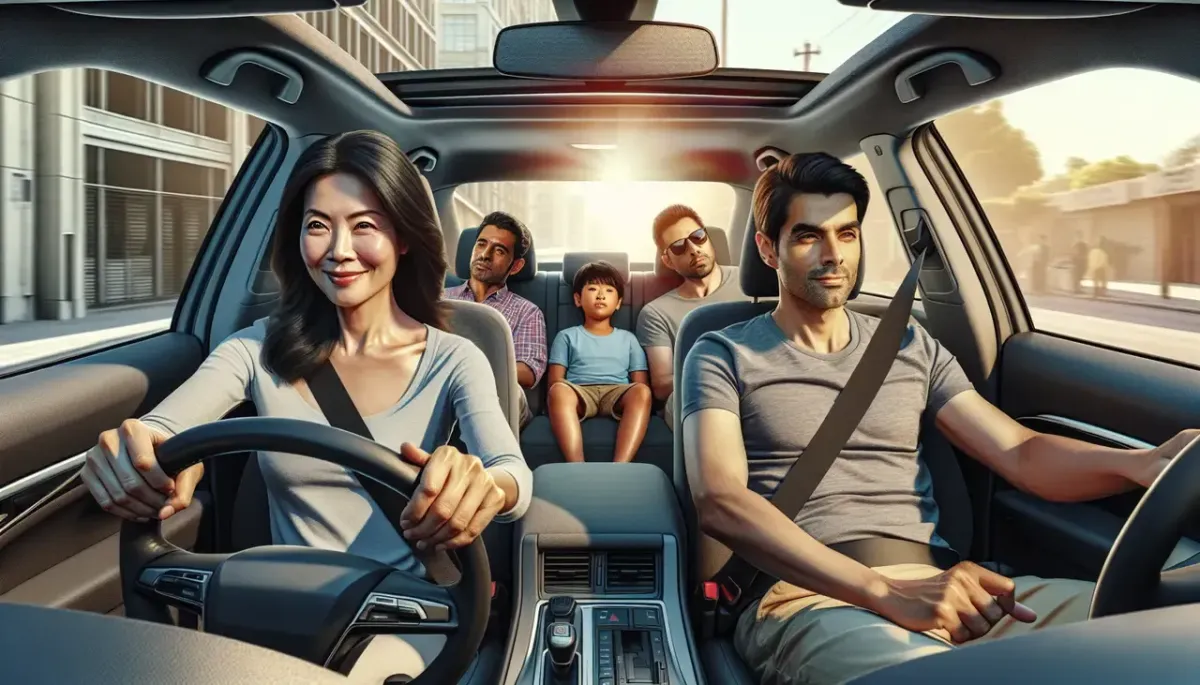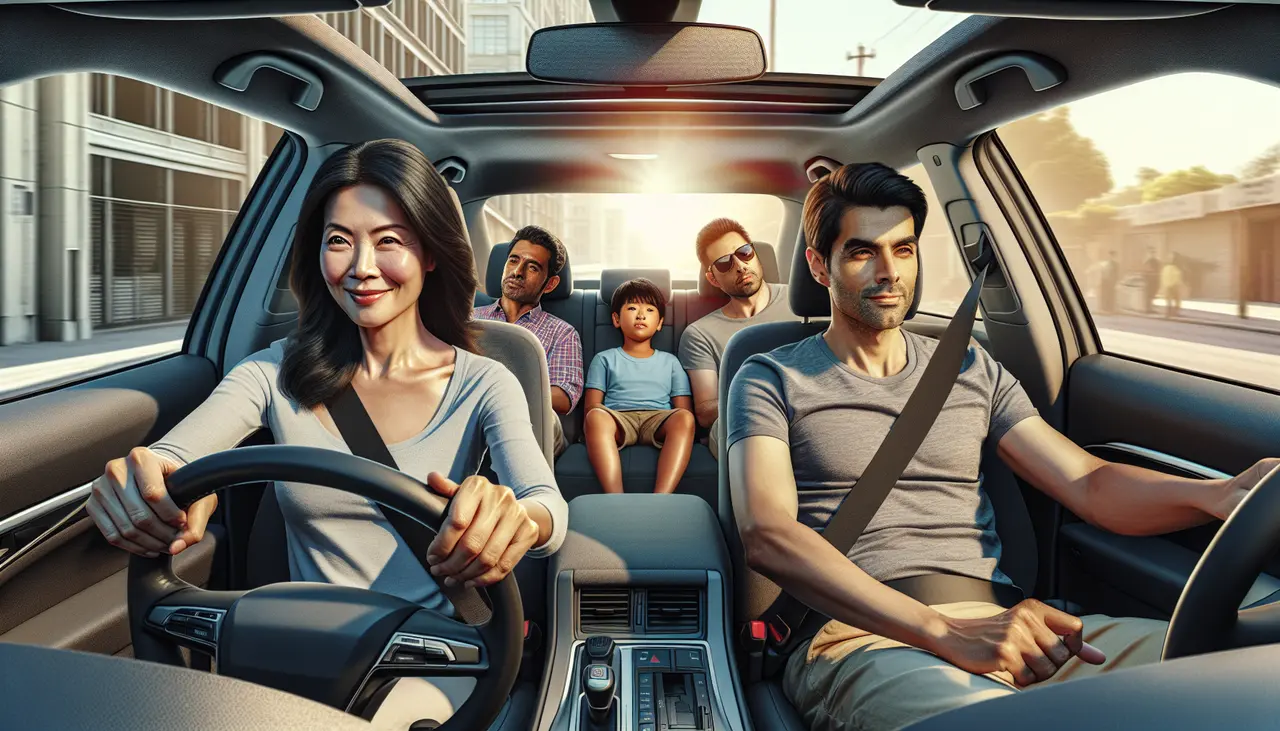My Awesome Detailer, LLC
My Awesome Detailer, LLC's Blog
"Auburn Alabama's #1 Resource for Ceramic Coating & Auto Detailing Information"

How Window Tint Can Improve Your Driving Experience and Safety
Dive Into Window Tint and Its Perks
Tinting isn't merely about aesthetics. It serves as a guardian, ensuring your space remains private while maintaining a cooler ambiance in your vehicle. This feature deflects damaging UV rays, safeguarding both you and your car's interior from the sun’s overpowering presence. Beyond these benefits, it enhances your vehicle's security and contributes to fuel efficiency by lessening the demand on your air conditioning system. In essence, window tinting is the understated champion that your vehicle rightfully merits.
Window tint is more than just a style statement; it upgrades your drive. So, what's the deal? For starters, it tames glare. Ever been blinded by the sun while driving? Tint dims that dazzle. Plus, it boosts privacy. With tint, your car's less of a spectacle, shielding your inside world. But it's not all about looks or hiding away. The real game-changer? UV protection. Those rays are bad news for both your skin and car's interior. Tint keeps most of them out, safeguarding both. And don’t overlook the cool factor – literally. Tint keeps your car cooler on those scorching days, making your journey way more chill. In essence, window tint elevates your ride by making it safer, more private, and cooler – in every sense.

The Role of Window Tint in Enhancing Driving Safety
Window tint serves a crucial role in road safety beyond just aesthetics. It reduces harsh sunlight and glare, ensuring a clear view of the road and surrounding vehicles. With tint, there's less need to squint or strain your eyes, especially on bright days or when the sun is directly in your eyes. Moreover, it provides protection against harmful UV rays, safeguarding your skin and preserving your car's interior from fading. In the event of an accident, tinted film can hold shattered glass together, shielding you from flying debris. Additionally, it helps to keep your car cooler, promoting focus and comfort on hot days. Therefore, window tint is not merely a stylistic choice but a significant safety feature that enhances the driving experience.
How Window Tint Improves Comfort and Visibility While Driving
Window tint serves a practical purpose beyond style. It enhances driving comfort and visibility by reducing the sun's glare and the intensity of bright lights. Tinted windows offer relief from squinting and sun rays during the day, while at night, they minimize glare from surrounding cars and streetlights. Additionally, the tinting helps to regulate the interior temperature of your car by blocking out a significant amount of the sun's heat. This cooling effect reduces the need for air conditioning, leading to fuel savings. Therefore, window tinting not only adds to your car's aesthetic appeal but also improves your driving experience by enhancing safety and comfort on a daily basis.
Window Tint and Its Effect on Interior Temperature Control
When the sun's blazing, the last thing you want is for your car to feel like an oven. That's where window tint comes into play. Think of it as your car's sunscreen. It blocks a lot of that bright, hot sunlight from getting inside. This doesn't just keep your car cooler; it means your air conditioning doesn't have to work as hard. So not only do you save fuel by using less A/C, but you also get into a car that's not scorchingly hot. This is a big win during those summer months or if you live in a warm climate year-round. Plus, maintaining a cooler interior helps keep your car's upholstery from fading and cracking, which can happen when it's too exposed to sunlight. So, a simple addition of window tint can save you money, protect your car, and make your drives more comfortable. No more feeling like you're melting the second you sit down.
Protection Against Harmful UV Rays with Window Tint
Window tint isn't just for looks. It's a shield, keeping you safe from the sun's fierce rays. Think about it like sunscreen but for your car's windows. UV rays from the sun can be harmful, not just to your skin but to the interior of your car too. They can cause fading and deterioration over time. By applying window tint, you block out up to 99% of these harmful UV rays, protecting both yourself and the inside of your car. It's like giving your vehicle a pair of sunglasses. This way, you're not just driving cooler; you're driving smarter and safer. So, next time the sun's glaring down, remember, window tint does more than just make your ride look sharp. It's your personal barrier against the invisible threat of UV rays.
The Impact of Window Tint on Privacy and Security
Window tinting does more than just make your car look cooler; it adds a layer of privacy and security you might not have considered. Think about it. When your car's windows are tinted, it's harder for people outside to see inside. This means your belongings are less visible to potential thieves looking for an easy target. It's a simple but effective deterrent. Additionally, in the unfortunate event of an accident, window tint can help hold shattered glass together, reducing the risk of injury from flying pieces. So, not only does tinting help keep prying eyes out, but it can also protect you and your passengers a bit better in tricky situations.
Understanding the Different Types of Window Tint Available
When you decide to tint your car windows, you're choosing comfort, privacy, and protection. But before you make that decision, it's essential to know the types of window tint out there. Let's break it down simply.
First, we have Dyed Window Tint. It's the most budget-friendly option. It's good for adding privacy and reducing sunlight, but it's not the best for heat reduction.
Then, there's Metalized Tint. This type goes a step further by reflecting heat using metallic particles in the film. It makes your windows sturdy, reducing the chance of shattering. However, it might interfere with your phone and radio signals.
Carbon Window Tint comes next. It’s a notch above because it does a great job at blocking heat, doesn’t fade over time, and it won’t mess with your signals. It's more about performance, with its matte-finish look also adding style to your ride.
Ceramic Tint is top-of-the-line. It offers superior heat and UV protection, doesn't fade, and doesn't affect electronic signals. Plus, it provides the highest level of clarity among tints. But all these perks come at a higher cost.
Choosing the right tint goes beyond just the look. Consider what’s important for you. Is it heat reduction, privacy, signal clarity, or maybe all of them? Each type has its benefits, so weigh them according to your priorities.
Legal Considerations and Compliance for Window Tinting
Before you dive into tinting your car windows, it's crucial to know the legal side of things. Not every shade of tint is legal in every place. The laws vary significantly depending on where you live. In some areas, dark tints are a no-go due to safety concerns for both drivers and law enforcement. You'll often find regulations are expressed in terms of the percentage of visible light allowed to pass through the tint, known as VLT (Visible Light Transmission). For example, some states might allow a VLT of 35%, meaning 35% of the light must pass through your windows. It's your job to check these rules. And don't think it's a one-and-done thing; laws change.
Getting it wrong with window tint can lead to fines or being asked to remove the tint, which is a headache you don't want. Also, consider how tint can affect your visibility during night driving or in poor weather conditions. You need to strike a balance between your comfort, safety, and compliance with the law. Always check with local authorities or a professional window tinting service to understand what's allowed in your area before making any decisions. In short, doing your homework pays off and keeps you on the right side of the law.
Professional vs. DIY Window Tinting: What You Need to Know
When it comes to window tinting, you've got two roads: professional or do-it-yourself (DIY). Let's cut straight to the chase. Professional tinting comes with a higher price tag but don't let that scare you off. You're paying for experience, precision, and high-quality material that lasts. Professionals have the tools and know-how to get it right the first time, ensuring your tint adheres perfectly without those pesky bubbles or peeling corners. Plus, they know the legal limits for tint darkness in your area, keeping you on the right side of the law. On the flip side, DIY kits are easy on the wallet. They give you the freedom to tint on your own time. However, without the right tools or experience, you might end up with a less than stellar job. Bubbles, uneven lines, or tint that's too dark can lead to redo's, or worse, fines for breaching legal tint limits. DIY is a learning curve, but if you're up for the challenge, it could save you some cash. Bottom line? If you value precision and hassle-free results, professional tinting is your go-to. If you're handy and looking to save money, DIY might just be your adventure.
Conclusion: Summarizing the Advantages of Window Tint for a Better Driving Experience
In wrapping up, window tint isn't just an aesthetic upgrade; it's about driving smarter and safer. It cuts down on glare from the sun and headlights, making it easier on your eyes. It keeps your car cooler on hot days, so you won't feel like you're melting the second you hop in. Privacy is another big win; it's harder for people to see inside your car. Plus, it helps protect the interior from fading. And let's not forget, in the case of an accident, tinted windows can help hold shattered glass together, adding an extra layer of safety. So, considering everything, adding tint to your car windows boils down to more than just making your ride look sleek—it's about enhancing your driving experience in several key areas.

My Awesome Detailer was founded with one mission: to bring elite-level vehicle protection and detailing to Auburn, AL and beyond.
Since day one, our focus has been delivering long-lasting paint enhancement, value retention, and top-tier appearance protection —with zero compromises.
We believe that true automotive care starts with clear communication and customized solutions, tailored to the specific needs of each vehicle and owner. From professional-grade ceramic coatings and self-healing paint protection film to precision paint correction and full-vehicle detailing, every service we offer is designed to elevate, protect, and preserve your investment.
At My Awesome Detailer, you don’t just get a clean car—you get long-term peace of mind and a finish worthy of a showroom spotlight.
Contact Info & Address
2709 Frederick Road, Opelika AL 36801
(334) 650-6499
Working hours
Monday: 8am-5pm
Tuesday: 8am- 5pm
Wednesday: 8am - 5pm
Thursday: 8am - 5pm
Friday: 8am - 5pm
Saturday: 8am-5pm
Sunday: Gone Fishin'
All Services by Appointment Only
Map
@ 2025 Copyright. MAD, LLC All rights reserved.
